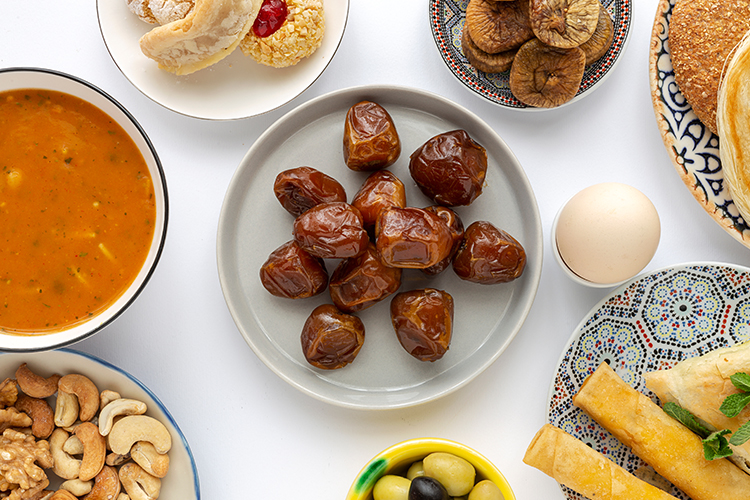SSS Team, SSSPORTS.COM

The holy month of Ramadan marks the beginning of a spiritual journey of reflection, deep faith-building and giving back to the community. While spiritual goals are observed during this time, fasting from dawn to dusk also means taking utmost care of your physical health to balance and manage day-to-day activities.
To guide you through a healthy fast this Ramadan, here’s Mitun De Sarkar, Clinical Dietitian and Founder of Simply Healthy, with her do’s and don’ts on fasting the right way during Ramadan.
My Father wanted me to become a doctor but I was keen to get into preventative healthcare. We found a middle ground and I took up Nutrition and Dietetics. I am really glad I had the vision to take up nutrition at a time when it wasn’t taken seriously or seen as a lucrative career option.

I have been fortunate to live and work in Dubai for more than 17 years. Over time I have realized that those observing fast during the Holy month of Ramadan tend to focus on abstinence. Some do feel that this may be an ideal time to quit junk food, smoking etc… and begin a healthy weight loss journey.
In my opinion, the number one myth is that One Diet Fits All.
Be it Keto, Paleo, exclusion of certain foods or macros, blood type etc…, there are several factors to be taken into consideration before choosing a diet plan, particularly if it is attached to a specific goal i.e. weight loss, athletic or any other health-related issue.
Another common myth is, if I lose weight fast, I will be able to keep it off. The more rapid the weight loss, the higher the chance of regaining most, if not all, and in some cases excess weight. Unless medically required, rapid weight loss tends to increase health issues rather than resolve them.
Fad and very low-calorie diets, which lack nutrients, are also commonly mistaken to be helpful. Even though some have proven to be beneficial in the short term, my advice is always to follow a diet under medical and nutritional supervision.
The Holy Month of Ramadan brings about the best in mental discipline. The positivity associated with the act of abstinence drives observers to manage their fasting with grace. I’ve always been impressed and in awe of the commitment and calmness associated with Ramadan. As a dietitian, my advice is to, if possible, undergo a physical check-up before fasting, to ensure there are no underlying medical issues that may come in the way of fasting.
If you are on any medication for any chronic illnesses such as diabetes, you must consult with your doctor to adjust the dosage of your medication.
If you love tea or coffee, a few weeks before Ramadan I urge my clients to reduce caffeine to avoid withdrawals or migraines while fasting. Instead of caffeine, I encourage my clients to stay hydrated and consume water infused with lemon, ginger, mint and cucumber.
It also helps to practice intermittent fasting a few weeks before Ramadan to get into a routine of fasting and ensure a seamless process is in place to avoid a sudden drop in insulin.
In addition, I recommend not indulging in a large feast for Iftar, as the period of fasting may increase acid production in some and could cause digestive issues. More importantly, a sudden spike in blood sugar due to a large meal could result in insulin-related issues, particularly in pre-diabetics or those trying to manage their blood sugar levels.

There are various researches underway to understand the benefits of fasting. Some studies suggest that the body tends to undergo a clean-up of cells by carrying out what is known as autophagy, where healthy cells clean out unhealthy cells in absence of calories. However, this research is still in its early stages.
Weight loss is another benefit of fasting, but only if the calories consumed are at a modest level during the non-fasting period.
I think Ramadan offers an excellent opportunity to observe how consuming different nutritious foods help us feel and if possible, convert this into a habit.
Manage your calories well. Do not over consume fatty, fried, spicy or processed foods. Keep sugar consumption in check too. Take up light exercises, especially if you plan on exercising during the fasting period.
If done correctly, there should be a reasonable amount of fat loss. Muscle building usually requires a calorie surplus with a higher than average amount of weight-bearing exercises. Due to the limitations of water consumption during fasting, the aim for muscle building during fasting periods may not advisable, but again this varies from person to person
It really depends on many factors – age, overall health and any pre-existing conditions. However, the more obvious ones to watch out for are nausea, vomiting, blurred vision, fainting, signs of significant dehydration or extreme fatigue, that do not resolve upon breaking your fast.
If you experience any of these symptoms, consult a medical professional immediately.
If you lead a busy work life, which prevents you from planning your post-fast meals properly, then certain supplements may help with compensating a few missing nutrients. However, I must add that supplementation is very individual, and a blood profile is recommended before starting any supplementation program to determine the level of certain nutrients required by an individual.
As far as energy systems are concerned, a reasonable amount of exercise is recommended depending on your fitness level baseline and without straining your system.
Avoid high-intensity exercises which require additional support, through proper hydration and nutrition, especially during the fasting window. If your work-life balance permits it, have a lighter Iftar and then plan your workout 1 or 2 hours after. In some cases, I advise clients to workout for 30 mins before Iftar in a fasted state which works well for fat burning.
Young, healthy individuals don’t encounter any issues except perhaps some digestive distress and sometimes an elevated uric acid. I’ve seen diabetic patients fast effortlessly and manage their condition well by simply following their medications, good nutrition and regular exercise routines. However, some diabetic patients on insulin or with poorly managed blood sugar levels may return with hypoglycemia, hyperglycemia, severe dehydration, excessive weight loss or ketoacidosis, which is concerning.
Despite the above, with proper medication management, nutrition and support of health professionals, fasting safely, is possible.
Power-packed Breakfast Jar
Method
Start layering first with the soaked Chia in almond milk, followed by the rolled oats and yogurt. Then layer each fruit one by one and sprinkle ground flax seeds at the end.
The quantities in this recipe can change depending on your hunger and overall calorie intake. This jar is filling, nutritious, rich in fibre and in essential fats, vitamins and minerals. It keeps your blood sugar levels stable, sustains energy levels and keeps you full for longer.
Tag us in your workouts on Instagram @sunsandsports.
Subscribe below to our newsletter and download our app on the App Store or Google Play for latest updates.
Meet Adam and Olivia McCubbin, fitness influencers and founders of Best Body Co. This husband-wife…